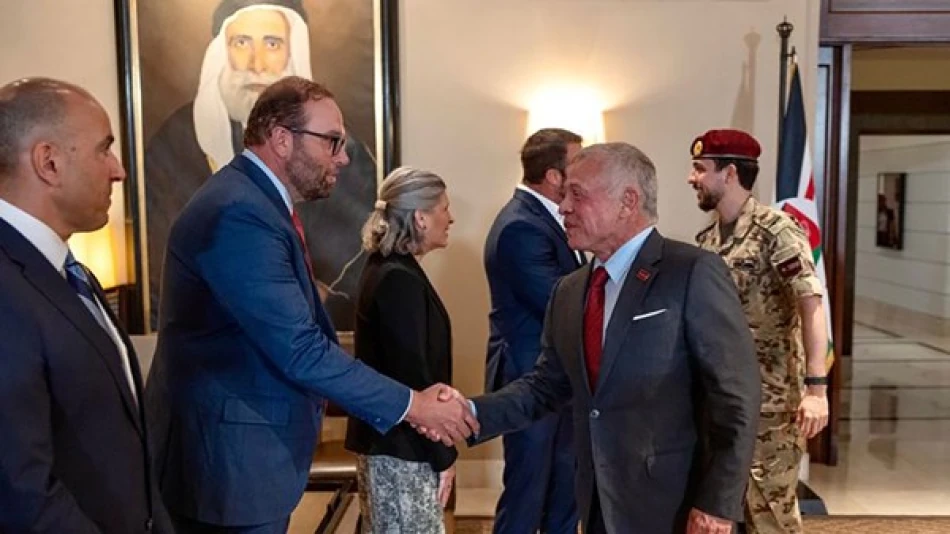
Jordanian King Condemns Israeli Claims on 'Greater Israel'
Jordan's King Abdullah Draws Red Lines on Israeli Expansion Plans in High-Stakes Congressional Meeting
King Abdullah II of Jordan delivered a forceful rejection of Israeli territorial ambitions during a critical meeting with U.S. Congressional delegates in Amman, signaling Jordan's firm stance against what it views as illegal Israeli actions that threaten regional stability. The monarch's emphatic opposition to "Greater Israel" rhetoric and unilateral West Bank measures underscores growing Arab concern over Israeli policy directions that could reshape Middle Eastern geopolitics.
Direct Challenge to Israeli Territorial Vision
During the meeting in the Jordanian capital, King Abdullah categorically rejected Israeli statements regarding a "Greater Israel" vision, describing unilateral Israeli actions in the West Bank as violations of international law that infringe upon Palestinian rights to establish an independent state. This represents one of the most direct diplomatic challenges to Israeli territorial ambitions from a key regional ally of the United States.
Jordan's position carries particular weight given its 1994 peace treaty with Israel and its role as custodian of Islamic holy sites in Jerusalem. The kingdom's firm stance suggests growing concern that Israeli policies could destabilize the carefully maintained regional balance that has underpinned decades of relative peace.
Gaza Crisis Takes Center Stage
Immediate Ceasefire Demands
The Jordanian monarch emphasized the urgent need for an immediate ceasefire in Gaza and ensuring humanitarian aid flows through all possible channels. His rejection of what he termed Israeli plans to consolidate Gaza's occupation and expand military control reflects broader Arab fears about long-term Israeli intentions in the territory.
Jordan's position on Gaza is particularly significant given its historical role in Palestinian affairs and its absorption of multiple waves of Palestinian refugees since 1948. The kingdom's demographic composition—with Palestinians forming a substantial portion of its population—makes regional stability a matter of internal security as well as foreign policy.
Strategic Implications for U.S.-Middle East Relations
The meeting with Congressional delegates highlights Jordan's strategy of directly engaging American lawmakers to influence U.S. policy in the region. By articulating clear red lines to Congressional representatives, King Abdullah is effectively lobbying for American pressure on Israeli policies that Jordan views as destabilizing.
This diplomatic approach reflects Jordan's understanding that sustainable regional stability requires active U.S. engagement and that American influence remains crucial in moderating Israeli actions. The kingdom's message to Congress appears designed to emphasize the risks of unchecked Israeli expansion to broader American interests in the region.
Regional Stability Concerns Extend to Syria
Beyond the Palestinian issue, King Abdullah stressed the importance of supporting Syria's security, stability, sovereignty, and territorial integrity. This position reflects Jordan's broader concern about regional fragmentation and its preference for stable, sovereign states over fragmented territories that could become sources of instability.
Jordan's emphasis on Syrian territorial integrity, coming alongside its opposition to Israeli expansion, suggests a consistent policy framework favoring established borders and opposing unilateral territorial changes—a principle that, if undermined in one context, could have cascading effects across the region.
Implications for Regional Order
King Abdullah's statements signal a potential hardening of Arab positions against Israeli territorial ambitions, even among countries that maintain peace agreements with Israel. This development could complicate Israeli strategic planning and force a reassessment of regional diplomatic relationships that have provided stability for decades.
The timing of these statements, delivered directly to American Congressional representatives, suggests Jordan views the current moment as critical for preventing what it sees as dangerous precedents that could fundamentally alter the regional balance of power.
Most Viewed News

 Layla Al Mansoori
Layla Al Mansoori






